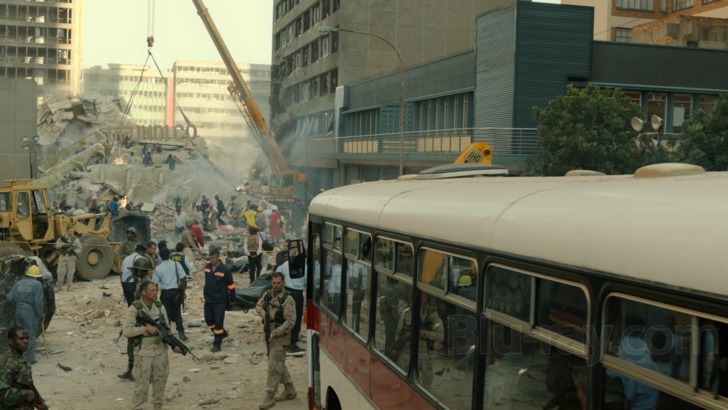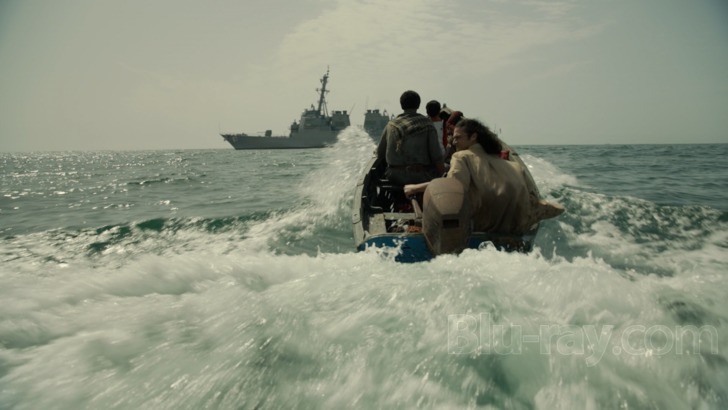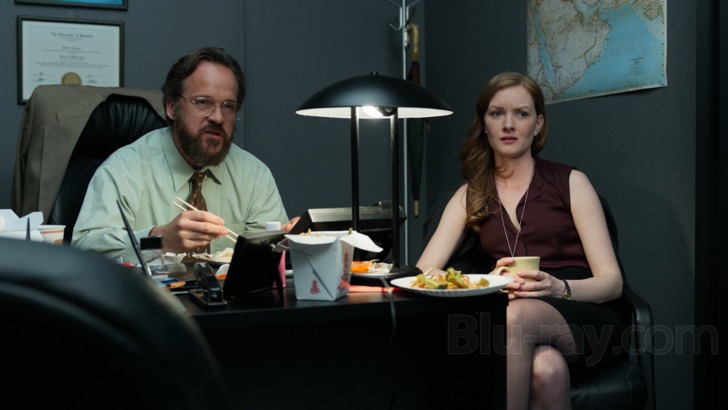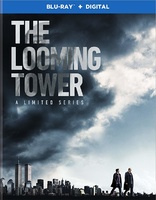The Looming Tower Blu-ray Movie
HomeThe Looming Tower Blu-ray Movie 
Blu-ray + Digital CopyWarner Bros. | 2018 | 550 min | Not rated | Sep 18, 2018
Movie rating
7.8 | / 10 |
Blu-ray rating
| Users | 0.0 | |
| Reviewer | 4.5 | |
| Overall | 4.5 |
Overview
The Looming Tower (2018)
The events that led to the deadliest terrorist attacks ever to take place on American soil are chronicled in a series that explores how rivalries within the intelligence and law enforcement communities hampered the nation's ability to defend itself.
Starring: Jeff Daniels, Alec Baldwin, Peter Sarsgaard, Michael Stuhlbarg, Bill CampDirector: Craig Zisk, Michael Slovis
| Drama | Uncertain |
| History | Uncertain |
Specifications
Video
Video codec: MPEG-4 AVC
Video resolution: 1080p
Aspect ratio: 1.78:1
Original aspect ratio: 1.78:1
Audio
English: DTS-HD Master Audio 5.1 (48kHz, 16-bit)
French: Dolby Digital 5.1 (448 kbps)
German: Dolby Digital 5.1 (448 kbps)
Italian: Dolby Digital 5.1 (448 kbps)
Subtitles
English SDH, French, German SDH, Italian SDH, Japanese, Danish, Dutch, Finnish, Korean, Norwegian, Swedish
Discs
Blu-ray Disc
Two-disc set (2 BDs)
Digital copy
Playback
Region A, B (C untested)
Review
Rating summary
| Movie | 4.5 | |
| Video | 4.0 | |
| Audio | 4.0 | |
| Extras | 4.0 | |
| Overall | 4.5 |
The Looming Tower Blu-ray Movie Review
Millennium Approaches (a Different One)
Reviewed by Michael Reuben September 24, 2018The Looming Tower is a Hulu miniseries based on a non-fiction book of the same name by
Lawrence Wright, who helped create and produce the show. Wright's account traced the history
of al-Qaeda in detail, from its historical roots to its full flowering in the biography and deadly
career of Osama bin Laden (or, in the alternative spelling used by U.S. authorities in the Nineties,
"Usama bin Ladin"). The miniseries opts for a different approach from Wright's book. It focuses
on the American intelligence community and its failed efforts to combat the growing threat in the
three years preceding 9/11. Co-creators Dan Futterman (the writer of Foxcatcher) and Alex
Gibney (the Oscar-winning documentarian behind Taxi to the Dark
Side and Enron: The
Smartest Guys in the Room) have extracted from Wright's work a cautionary history lesson that
is essential viewing for anyone who wants to understand how bin Laden's loosely organized
group could so effectively perpetrate the deadliest attack on U.S. soil since Pearl Harbor.
Hulu began streaming The Looming Tower (or "TLT") on February 28, 2018, with the final
episode released on April 18. Outside the U.S., the series is distributed by Amazon Video.
Warner is releasing it on Blu-ray through its partnership with production company Legendary
Entertainment.

In the years immediately preceding 9/11, both the FBI and the CIA were investigating a series of escalating attacks by al-Qaeda on U.S. targets in the Middle East. In August 1998, two near-simultaneous truck bombs wrecked U.S. embassies in Tanzania and Kenya; TLT confines itself to the Kenya explosion, which had the higher death toll (213 vs. 11 in Tanzania). In October 2000, the destroyer USS Cole was badly damaged, and seventeen U.S. sailors killed, after suicide bombers drove a small speedboat rigged with explosives into the ship when it stopped to refuel in Yemen. Al-Qaeda claimed responsibility for all three attacks.
Numerous professionals in the U.S. intelligence community recognized these episodes as the buildup to something much bigger and more deadly, but their efforts to track the perpetrators and prevent the coming attack were hampered by multiple factors. For one thing, the bulk of the U.S. defense establishment remained preoccupied with traditional state adversaries like Russia and China. Even more importantly, as TLT demonstrates at length, the intelligence community itself was riven by conflict and competition. Cooperation was token, and critical information was not shared. Multiple post-9/11 investigations revealed that the attacks on the Pentagon and Twin Towers might have been prevented if only the FBI and CIA had been willing to talk to each other. (These failures led to the creation of the Department of Homeland Security and the Cabinet-level position of Director of National Intelligence.)
TLT dramatizes these intelligence failures, as the clock ticks down to 9/11 with the inevitability of a Greek tragedy. The series doesn't hesitate to pick heroes and villains. The lead hero is FBI Special Agent John P. O'Neill (Jeff Daniels), whose interest in al-Qaeda dated from the first bombing of the World Trade Center in 1993. Frequently described as "larger than life", O'Neill was a legend in the FBI for his toughness and personal magnetism—and he was also notorious for the excesses of his personal life, which he "lived large" in a style far beyond what an FBI salary could support. A life-long Catholic, he had a wife and children, as well as multiple mistresses—TLT features two, but in real life there were more—none of whom knew that he was married. By all accounts, he was ferocious in pursuit of his goals, both in his investigations and in his handling of internal FBI politics. The latter quality, along with the carelessness of his personal habits, ultimately led to his forced retirement in 2001.
But by then, O'Neill had recruited a talented successor, Ali Soufan (Tahir Rahim, A Prophet), who was one of only eight Arabic-speaking agents in the Bureau at the time. A practicing Muslim, Soufan became O'Neill's chief investigator, whose language skills and intimate knowledge of the Quran made him a skilled interrogator of suspected al-Qaeda operatives. Soufan is another of TLT's heroes, as he and O'Neill doggedly chase leads across the globe, both of them increasingly certain that something much worse than the embassy and Cole bombings is just around the corner. (The real Ali Soufan is one of the series' producers and provided extensive technical advice in the re-creation of its historical settings.)
The series' tertiary hero is Richard A. Clarke (Michael Stuhlbarg, in an uncanny impersonation of a familiar figure), who served under Presidents Reagan and the first Bush, and then became the top official for counter-terrorism in the Clinton White House, with an office in the West Wing. Clarke shared O'Neill's and Soufan's concern about the rise of al-Qaeda and famously predicted in the summer of 2001 that "something really spectacular is going to happen here, and it's going to happen soon". Clarke would later become the only member of the intelligence community to issue a public apology to families of the victims of 9/11 and the American people for the government's failure to protect them. The statement was made before the 9/11 Commission in 2004, and the event is reproduced in TLT, which repeatedly flashes forward to those hearings for clarification and insight. (As the creators note in the extras, they have conflated the work of several post-9/11 inquiries for dramatic purposes.)

Situated midway between hero and villain is CIA Director George Tenet (Alec Baldwin), whom Richard Clarke would later describe as "running around with his hair on fire" as he tried to get the Administration of the second President Bush to focus on the imminent threat during the summer of 2001. Tenet is an ambiguous figure in TLT, neither affirmatively blocking the FBI's access to information nor making any effort to foster interagency cooperation. He seems far more concerned with preserving his "back channel" relationship with the Saudi ambassador, Bandar bin Sultan (Buck Hujabre), an equally ambiguous figure whose rapid exit from the U.S. after 9/11, along with other Saudi nationals, is facilitated by Tenet and has long prompted speculation about what Bandar did or didn't know in advance. Tenet was infamously evasive after 9/11, and TLT contains a lengthy sequence of his non-responsive answers before the 9/11 Commission. Equally evasive are the answers given by President Bush's National Security Advisor, Condoleezza Rice (Eisa Davis), who has to be forced under cross-examination to admit that a PDB ("President's Daily Briefing") from August 2001 bore the headline: "Bin Ladin Determined To Strike in US", and that no action was ordered in response. You watch these scenes at the beginning of Episode 9, and you have to wonder whether the script has been slanted to make these two public servants appear so feckless and inept. But then the episode ends with the real-life footage from CSPAN—and their testimony matches the script word for word.
TLT effectively juggles a vast array of characters and locations, using the investigative efforts (and frustrations) of O'Neill and Soufan as a golden thread to guide the viewer along the twisting path toward the disaster we know is coming. It is O'Neill who emerges as the tale's tragic hero. In fiction, a righteous character who bulldozes past procedural niceties in a fierce desire to protect the nation would succeed, and the audience would cheer him on (Jack Bauer, anyone?). In real life, people who behave that way make enemies, as O'Neill is shown to do throughout TLT, and then they get sidelined. O'Neill was passed over for promotion, barred from further investigation in Yemen by the U.S. Ambassador (Jennifer Ehle), and eventually forced out of the Bureau after confidential information about his personal failings (which were considerable) was leaked to the New York Times. He left the FBI in August 2001, accepting a private sector job that would finally give him a salary commensurate with his expansive lifestyle. The new position was head of security at the World Trade Center, and O'Neill was in his office on the 34th floor of the North Tower when it was hit by American Airlines Flight 11. He never made it out of the building.
The Looming Tower Blu-ray Movie, Video Quality 

The Looming Tower was shot digitally. The principal cinematographer was Jim Denault (Bad
Moms), who explains in the extras that he and a second cinematographer, Frederick Elmes (Blue
Velvet), established two palettes for the series: warm tones for scenes with intelligence and law
enforcement personnel, and cooler hues for scenes focusing on terrorists. The two palettes
gradually converge as 9/11 approaches, and the impact is subtle but effective.
Warner's TV division has distributed the ten episodes of TLT across two 1080p, AVC-encoded
BD-50s, and consistent with their usual practice, they have failed to utilize all of the available
space to maximize the bitrate and provide the best possible image. Average bitrates per episode
range between 15 and 16 Mbps, which is adequate for digitally originated material but does not
improve upon the quality of the streaming version available on Hulu and Amazon. Still, the
digital imagery is sharply crisp and detailed, with only an occasional blemish like the flickers of
aliasing on the CG re-creation of the World Trade Center towers. Blacks are solid, colors are
understated but distinct, and contrast is uniformly superior, even in darker scenes. The extensive
historical footage from news broadcasts, airport security tapes and amateur video recordings has
been seamlessly integrated into the drama, and the transitions are often imperceptible, even
where the historical footage is of lesser quality.
The Looming Tower Blu-ray Movie, Audio Quality 

Hulu streamed TLT in stereo, and it still does not fully support 5.1 sound on all devices. But TLT arrives on Blu-ray with an effective 5.1 soundtrack, encoded in lossless DTS-HD MA, that adds substantial impact to the drama. Much of TLT consists of people talking in rooms, but there is a wide variety of locations for which the 5.1 mix creates distinctive environmental ambiance, ranging from the unnerving quiet of the CIA's Alec Station to more boisterous locales like the famous (and now departed) Elaine's bistro, where John O'Neill was a regular fixture. Rear channel effects are especially noticeable in unsettled Middle East locales where gunfire is continually erupting in the distance on all sides. Bass extension is deep and disturbing in scenes like the Nairobi bombing or when O'Neill feels the airplane hit the North Tower as he sits in his office below. Dialogue is clearly rendered, properly prioritized and subtly adjusted for the location (e.g., the 9/11 Commission testimony, where microphones and acoustics add a distinctive reverb). Composer Will Bates, a frequent collaborator with co-creator Alex Gibney (e.g., Going Clear: Scientology and the Prison of Belief), supplied the artful score, which neatly shifts musical styles to match the series' far-flung locales.
The Looming Tower Blu-ray Movie, Special Features and Extras 

All of the extras, except for the Episode 1 commentary, can be found on disc 2.
- Commentaries: Of the two commentaries included with this set, the first is more informative regarding the series' overall design and conception. The second focuses more on specifics of creating the final episode.
- Episode 1: With Creator/Writer Dan Futterman and Creator/Writer/Director Alex Gibney
- Episode 10: With Creator/Writer Dan Futterman and Director Craig Zisk
- The Looming Tower: Divided We Fall (1080p; 1.78:1; 7:13): Wright, Gibney, Futterman and most of the principal cast discuss the history behind the series. They are joined by the real Ali Soufan, one of the series' producers.
- The Complexities of Character (1080p; 1.78:1; 11:28): The cast and creators confront the challenges of re-creating history and portraying real people, many of whom are still alive.
- Ali Soufan: In His Own Words (1080p; 1.78:1; 10:05): This is as much a portrait of John O'Neill as of his protégé, with Soufan providing a vivid account of meeting and working for his late friend and mentor.
- Across Three Continents: Creating The Looming Tower (1080p; 1.78:1; 10:34): Production designer Lester Cohen, Futterman, Gibney and others describe the challenges of building sets and finding locations in New York, Morocco and Johannesburg.
The Looming Tower Blu-ray Movie, Overall Score and Recommendation 

As the new millennium dawned, fears abounded that some catastrophe would befall the world at
midnight on the last day of 1999 and first day of 2000. The intelligence community feared a
terrorist attack, perhaps on the unusually large crowd gathering in Times Square, and TLT depicts
the feverish preparations in anticipation of disaster. But the new century began without incident.
The moment that would change America's direction and define it for this epoch didn't arrive
until nearly two years later, on a crisply sunny late summer morning when no one was expecting
anything out of the ordinary. TLT illuminates how a small and loosely affiliated network of
mostly amateur recruits successfully circumvented the most sophisticated efforts of the world's
mightiest nation to protect itself. Highly recommended.
Similar titles
Similar titles you might also like

The Attack
2012

Shock and Awe
2017

Labyrinth of Lies
Im Labyrinth des Schweigens
2014

The Look of Silence
2014

Fahrenheit 11/9
2018

The Gatekeepers
2012

Fahrenheit 9/11
2004

Untold History of the United States
Oliver Stone's
2012-2013

Munich
2005

Game Change
2012

Hillary's America
2016

Roger & Me
1989

American Experience: Freedom Riders
2011

Enron: The Smartest Guys in the Room
2005

Cradle Will Rock
1999

Shadow Dancer
2012

Syriana
2005

The Roosevelts: An Intimate History
2014

Dawson City: Frozen Time
2016

The Personal History of David Copperfield
2019
